 TRANSPORT TRANSPORT |
 Changing Face Changing Face |
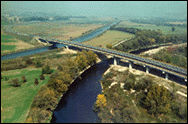
Infrastructure in Slovakia is generally up to Western standards. The institutional framework for transport policy is already in line with the Acquis Communautaire. Currently, there are approximately 17,700 km of roads, with plans to build an additional 450 km. About 3,660 km of railroad track exist, linking all of the country's major cities and many smaller towns.
Although Bratislava, the Slovak capital, is probably the last European capital city without a subway, the country has developed tram and light rail networks in all major cities including Bratislava and Kosice, where Slovakia's main airports are also located.
Substantial financial tensions regarding all types of transport go hand in hand with the decline in shipping exports. From an alternative perspective, intensive preparation for the transformation of the railways is in progress, air and water transports are undergoing restructuring and the Slovak bus transport is being privatized. Major government investments are being directed to the construction of motorways and the modernization of railway tracks.
 Road and rail transport Road and rail transport |
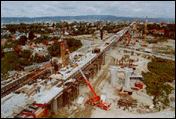
Extensive economic growth in Slovakia during the period of Vladimir Meciar's government was greatly supported by generous governmental investments. Out of all governmental investments, a significant amount of money was directed to the infrastructure sector, especially regarding ambitious motorway construction programs.
This development was unsustainable in the long run, and after 1998 the program became too expensive for state financing; consequently, infrastructure projects were put on hold and this had a drastic effect upon Slovak construction companies. Sections of the new transnational highway between Bratislava and Presov are already being built, however further development has to be considered.
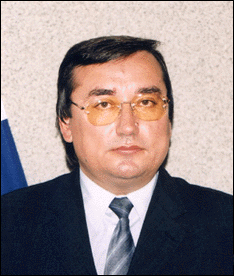
"Slovak motorways are part of the Trans-European corridors approved by the European Ministers of Transport" underlines Mr. Jozef Macejko, Minister of Transport and Telecommunication of the Slovak Republic. Therefore, financial aid from the PHARE, ISPA and SAPARD EU programs could lead to a tolerable situation. "We want to keep on building highways on the same rythm," Macejko says. Thanks to EU-help, the first Slovak highway tunnel in Branisko was also constructed in Eastern Slovakia.
A certain asymmetry exists in the competitive relationship between rail and road transportation. After the program for motorway construction got re-evaluated, state support was also granted for the development of Slovakia's rail corridor. Since 1990, annual road development in Slovakia has increased by 150 % in comparison to Slovakia's shipping performance that has increased by just 10 %. More than 5,000 active carriers have substituted the once socialist national road transport monopoly.

A much more complicated situation arises when considering Slovak bus transport. Public transportation is common among all cities in Slovakia, it is a state-owned company incorporating 17 bus organizations, which are undergoing transformation. "There is not a single village in Slovakia that wouldn't have a bus stop," says Mr. Emil Binda, General Manager of the Slovak Bus Carrier (SAD) describing the importance of SAD for Slovakia.
The privatization of the companies within the state-owned
SAD group could bring commercial prosperity and
reliability for public transport within this sector.
|
Significant investments are needed to renovate the obsolete bus transportation system. "I would like the public bus transport to keep a role within the society and not get to the level it has in more developed countries where it plays a minor role" stated Mr. Binda.
Technical under-development is a burden carried by ZSR, the highly indebted and over employed Slovak railway operator.
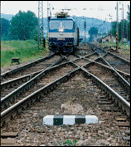
Almost 5000 employees make ZSR the largest state-owned enterprise. Its market share is about 8 % in Slovak public transport, and almost 60 % in cargo transportation. The state ordered improvements for public transport facilities, however it never compensated its demands by the necessary financial funds. This development combined with the tunneling of railway assets following badly closed contracts, loans and the redirection of service activities to private companies, was reflected in its economic results. ZSR is in debt to both the Social security system and regional power distributors. The restructuring of ZSR is a long and painful process. The foundation for the concept is based on the decision to split the present ZSR into 2 companies that would separate their servicing activities.
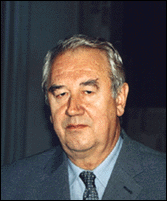
The Railway Company is going to be created as a 100% joint-stock company of the state, and will provide business in public transport and cargo, using state rolling stocks. The Traffic Road Company is going to work as an infrastructure operator, so while providing state-owned property it will be established as a state organization with specific rules. "From the 1st of January 2003, access to the transport market will be completely liberalized," notes Mr. Andrej Egyed, General Manager of ZSR (Slovak Railways). Trade Unions are strongly opposing this project, as 12 to 16 thousand surplus employees will have to leave the company.
Water and air goods transportation is marginal in Slovakia. The countries small geographic area and adjacent important airports situated in near by Vienna and Budapest, together with lack of solvent clientele and a weak capital base did not permit the establishment of a strong national airline. Two companies provide domestic flights; most international travelers come to Slovakia via Vienna Airport. Therefore, the idea of a national air carrier is slowly being replaced by services for commercial companies to meet all market needs, namely contractual chartered transportation. In the beginning of 2002, Sky Europe, a low-cost airline, started operating domestic flights between Bratislava and Kosice, pushing the ticket price down for more than two thirds and planning to open some new routes towards Western Europe and other international destinations.
With the exception of the Danube River, which suffered badly from the Balkan war, the Vah River represents the only navigable international waterway in Slovakia. Just one company transports people and goods on the waterways of Slovakia, Slovenska plavba a pristavy (SPaP). It has a fleet of 250 vessels at its disposal, they are all of different types and efficiency of which 10 are passenger riverboats and the remaining vessels are river freighters. The naval division consists of three ships for the transport of dry cargo, on behalf of foreign companies. Just 2% of all goods are shipped on Slovak water.
The Slovak Post provides universal postal services and has the national monopoly in the area of the Slovak Republic. "State assigns postal exception regarding the letters up to 1,000 grams. We are the only ones allowed to deliver these letters" says Dr. Jaroslav Dobrotka, General Manager of Slovak Post, and adds that this is a similar pattern present all over Western Europe. The new Postal Act has been written to follow the strict guidelines outlined by the EU.

In the near future, there is a plan to transform the Slovak Post into a joint stock company, remaining in the hands of the state. "We have studied a few projects regarding this transformation and most probably a special law project will soon be approved," adds Mr. Dobrotka. Although privatization in the postal sector is irregular all over the world, some changes can be expected in the next decade after the Postal Union Congress in 2003.
The Slovak Post is also one of the main shareholders of Postova Banka (Postal Bank), which is one of the last state-owned institutions in the banking sector . There is a ten-year cooperation agreement signed between the Slovak Post and Postova banka, advantageous for both sides. A wide network of Post offices used as bank branches all over Slovakia is Postova banka's main asset. |

